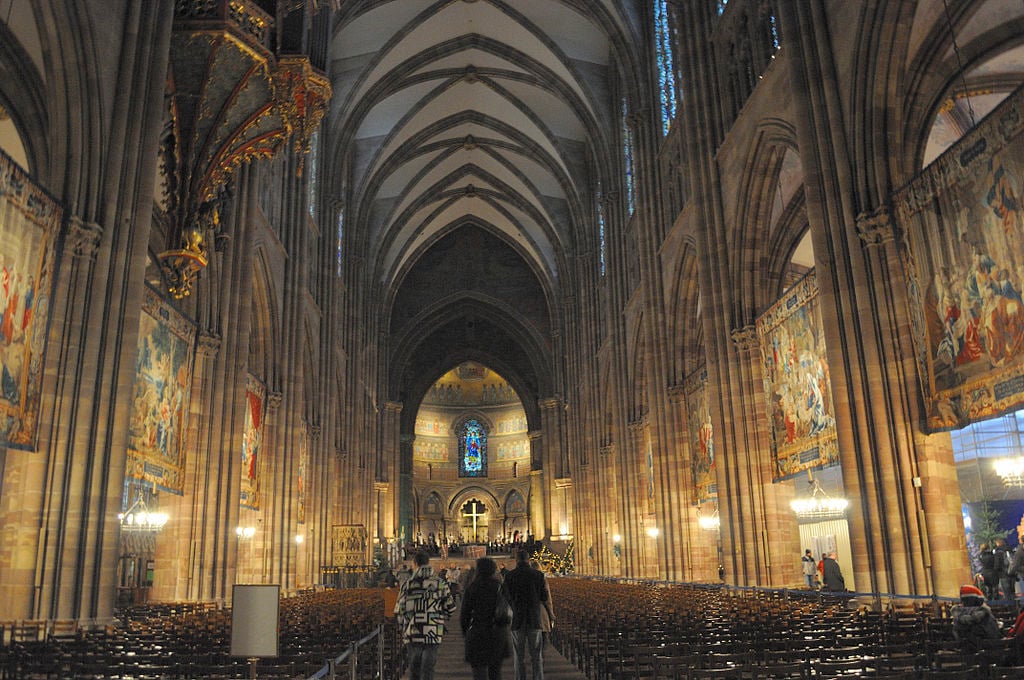There’s been a panel discussion between Peter Thiel, N.T. Wright and Ross Douthat, as I relate in my other haunt at Forbes, organized by the Veritas Forum, a Christian organization.
Readers here will probably be familiar with Wright, orthodox Christian theologian and one of the greatest Biblical scholars alive, and with Douthat, the conservative Catholic Times columnist. They might not be so familiar with Thiel. Thiel is one of the most prominent entrepreneurs and investors in Silicon Valley and, relevantly for this, he is also one of the most interesting public intellectuals alive today. Thiel’s thought is really hard to summarize, but basically insofar as we’re concerned here he’s a futurist who warns that technological progress has dramatically slowed down over the past thirty years, with dire consequences, and that if technological progress doesn’t start accelerating soon again, there will be even more dire consequences. Relevantly for us, Thiel has also publicly identified as a Christian (though he is vague about specifics); he started a foundation to promote the thought of René Girard, a Christian intellectual whom frequent readers will know I deeply admire. Thiel clearly believes in a civilizational need to rediscover the idea of progress and the necessity to make this progress a reality.
I view Thiel’s choice to give his talking points on decelerating innovation at the Veritas Forum and in dialogue with Wright as more specifically a call to Christians to rediscover this idea. As Thiel noted, Christianity was the first religion not to harken back to some lost Golden Age; the Heavenly Jerusalem will not be merely the Garden of Eden; in fact, it will be better. Christianity infected the world with the idea that the future could be radically better than the past, as with the idea that humans specifically had a mission, “ruling” over Creation, to anticipate the Heavenly Kingdom and to change the world in the here and now. As Thiel pointed out, Christians were the first group to say, loudly, that the future would be better than the past, that there could be a definite picture of it, and that humans could make a difference and bring about a better future. I think one of the few things that all of the panelists that day agreed on is that it’s no coincidence that the scientific and technological age grew out of Christian civilization.
Today, Christians have knee-jerk negative reactions to techno-utopian talk and, don’t get me wrong, there are some serious ethical concerns with many of the schemes being cooked up in the wilder sections of Silicon Valley. As important as those are, please bracket them for the foregoing.
One of the things Thiel notes is that it’s hard to imagine a politician today proposing the equivalent of the Manhattan Project or the Apollo Project or Nixon’s plan to defeat cancer; proposing a specific, ambitious vision of the future and a specific plan for accomplishing it.
And it got me to think: the High Middle Ages equivalent of the Apollo Project were…the cathedrals.
In many ways, the medieval cathedrals embody what is best about the human spirit. They were the first man-made structures to go higher than the Pyramids, and this fact alone says a lot about the difference between the Ancient, Pagan world and the Christian world. A pyramid is a fat structure with a heavy base, while a cathedral soars towards the sky. A society that builds pyramids is a society based on slave labor: building a pyramid is pretty much about using as much raw muscle strength as possible to take many rocks from point A and pile them up on point B. Meanwhile, a society that builds a cathedral is replete with scientists, mathematicians, engineers, craftsmen, artists… A pyramid is a monument dedicated to death–it is a tomb. A cathedral is a monument dedicated to the triumph over death.
The great achievements of the High Medieval Church, not only the cathedrals, but the university (a Catholic invention!) and the great monastic orders, took it for granted that to be the Church was to be at the vanguard of Progress, or at least at the vanguard of intellectual inquiry and innovation. Christians tend to look askance at “Progress”, but that is only because we no longer guide it. The monastics were nothing if not innovators, and the orders were the great startups of the day. The technological and other accomplishments of the great monastic orders are simply staggering.
One of the points that Wright made during the panel and makes frequently in his public speaking is that the Gospel preached by the New Testament Church was not so much about a moral philosophy or, worse, a way-to-get-to-Heaven, but rather, the announcement of a fact, the fact not only of the bodily Resurrection of Jesus Christ, but of the Lordship of Jesus Christ in the here and now and the existence of His Kingdom, which is not merely a future Heaven, but rather this very Universe, which will be utterly transformed in the Eschaton, but this eschatological future is anticipated and built in the here and now by the Church, and the Kingdom of Jesus Christ already exists, albeit in a mysterious way, in the here and now. This means that what Christians have to do in the here and now is, in Wright’s words, “Kingdom-work”, building the Kingdom.
The kind of bold, society-transforming, technologically-innovative endeavors that Thiel is talking about used to be seen as self-evidently part of “Kingdom-work” for the Church–but no longer.
The Church seems to suffer from a bit of Stockholm syndrome whereby we’ve integrated the materialist worldview in deep ways even as we combat it on the surface. While contra the materialists we insist on the compatibility between science and religion, we actually agree, at least too often in practice, with the materialists that science is a thing apart from religion which has a life of its own. Religion can perhaps critique it, but it is not a work to be done by the Church. Suffice it to say, the monk Nicolaus Copernicus would find it bizarre. So would Isabella of Castille, who finished the Reconquista and funded Christopher Columbus.
As you know, this dovetails with my preoccupations nicely. I keep being frustrated by the seeming lack of urgency within the Church about being at the vanguard of innovation in so many domains. The Church, despite being much smaller, used to see the world confidently as a horse to be ridden into the sunset, not as a dangerous force to be held back.
We Christians are not dualists. There is not the spiritual realm we inhabit on the one hand, and the dirty world on the other. Instead, there is one glorious Creation, which we were given to subdue and rule over and divinize.
I write all this well-aware, and sharing to an extent, the inevitable critiques. The boastful self-confidence of the High Medieval Church led to the dank corruption of the Renaissance Church, and to the excesses of the Inquisition. (Then again, the Renaissance Church was still at the vanguard of funding and supporting the world’s smartest people.)
But we are all hyper-aware of how utopianism can go wrong. But it seems to me we might not be aware of how not being utopian is a dereliction of duty.
The Green Revolution. Microfinance. Malaria eradication. All of these are some of the most important trends of the past sixty years in terms of improving the lives of the poorest of the poor on this planet. All of these happened and are being led from outside the Church. There is something deadly wrong with this picture. That the Church has countless extremely dedicated people doing very admirable development work, while true and important, is not an excuse. If anything, it is an aggravating circumstance. Catholicism is not just supposed to be holier, it’s supposed to be smarter. Holy is hard, but smart is easy, or at least should be for us. If we can’t even do that, what are we good for? The Master gave us talents, a lot of them, and he wants a return on his investment. And you don’t get a high return without betting on big, risky ventures. I’m tired on being on Team Care Bears. I want to be on Team Gets Sh$& Done.
Where are our cathedrals? I don’t think it’s a coincidence that we’ve stopped building actual cathedrals at the same time we’ve stopped building metaphorical cathedrals.
I increasingly think about Dorothy Day. Dorothy Day might be thought of on the surface as the polar opposite of Peter Thiel, but I don’t think it’s that simple. When her canonization process started, the US bishops described Dorothy Day as “the saint for the modern age”, and I think she really was. They were probably thinking of her staunch criticism of social injustice and her recovery from abortion, but I think there’s a different way in which she is the saint we need for the modern age: she was a utopian.
She was a nonviolent utopian, which is key, contrary to so many utopians of the 20th century. And she was also a practical utopian. Dorothy Day did not just start a newspaper to discuss utopian ideas. She did not even just start soup kitchen. Dorothy Day wanted to take down capitalism, and she started credit unions and farm cooperatives to do so. She Got Sh$& Done.
The Church responds to erroneous utopias with critique and defensiveness. And erroneous ideas should be critiqued! But there was a time when the Church saw itself as the steward and the agent of, if not utopia, then quasi-utopia. We should respond to bad utopias also with better utopias.
I think this is a key point that we need to listen to from Thiel. Wright said that Christians must do “Kingdom-work”, but for Wright, this means, in particular, serving the poor, education, and healthcare, and that’s true. But, first of all, we’re not innovative in those. And second of all, shouldn’t we have a broader definition of “Kingdom-work”?
Thiel’s musings about biotech or the Singularity drive us into thorny ethical terrain, but take something like Google’s self-driving car. If the self-driving car works and becomes widespread, it will save millions of lives from traffic accidents. But moreso, it will have a dramatic effect on transportation and infrastructure and make cities tremendously more liveable and enable human flourishing in many ways we can’t even imagine. Interestingly, in one of his books, Grand New Party, moderator Ross Douthat had a riff about how infrastructure policy is really family-values policy–if people don’t spend three hours every day commuting, they will spend more time with their families and families will be healthier and happier.
Yet if you ask an intellectual Christian–who thinks of themselves as a Christian–about the self-driving car, his answer might either be “Here’s eleven different ways this can go wrong” or, worse perhaps, “Why,” essentially, “are you asking me? This might be very good, but how does it concern me as a Christian?”, in a way that they wouldn’t if asked, say, about care for the poor. And I view this as a big problem. We need a bigger understanding of Kingdom-work.
In the Church, we are very aware of the perils of “immanentizing the Eschaton,” and rightly so. But we forget that we have a mission to “eschatonize the immanent.” That was the job of Adam in the Garden, to divinize the world as High Priest. That is the job of the Israel in the Old Testament. And that is the work of the Church, and of Christians, who are anointed as King, Priest and Prophet. After all, another word for “eschatonizing the immanent” is “transubstantiation”–the “source and summit” of our lives.
Let’s go.
Strasbourg Cathedral, by DerHexer, Wikimedia Commons – Own work. Licensed under CC BY-SA 4.0 via Wikimedia Commons.













